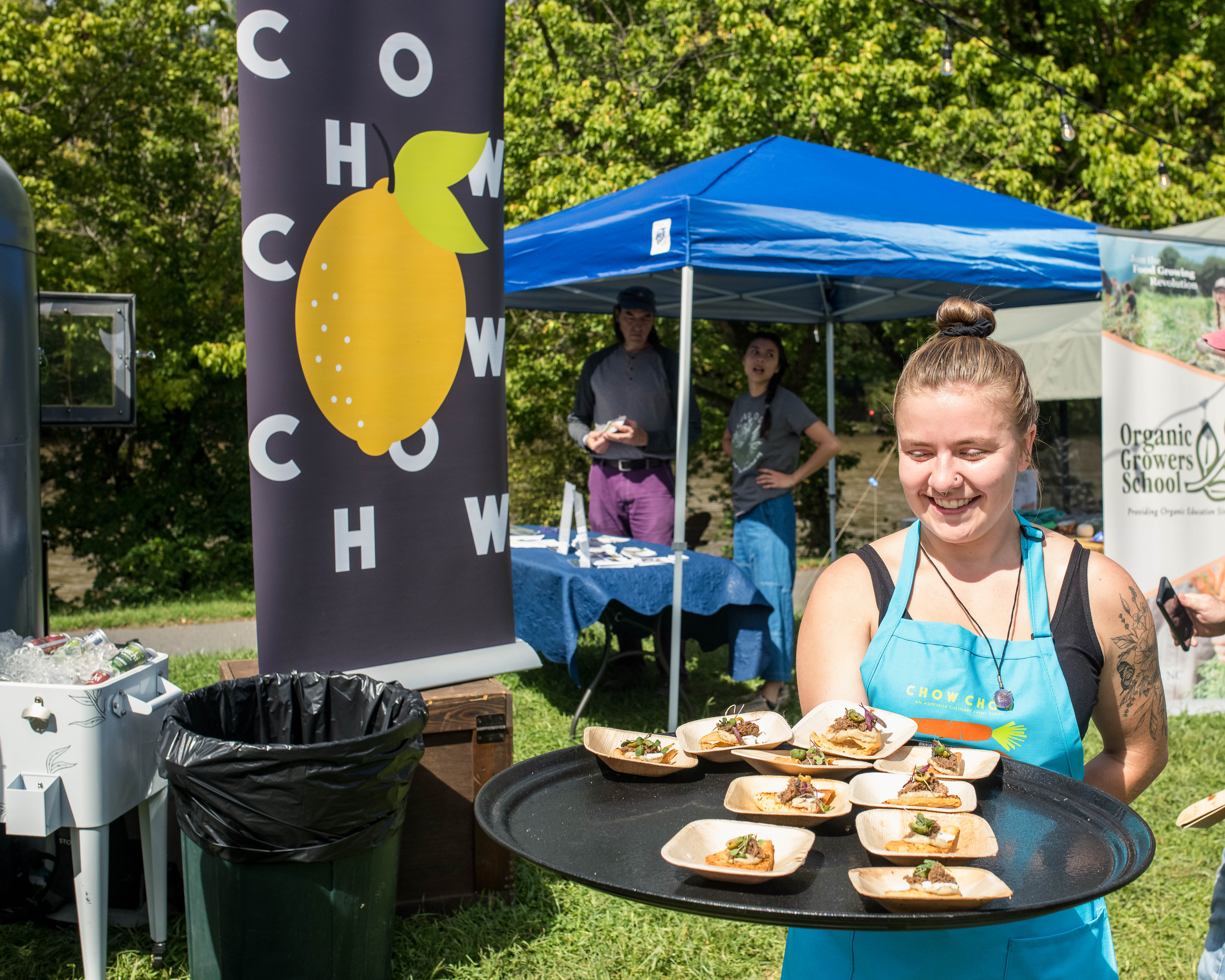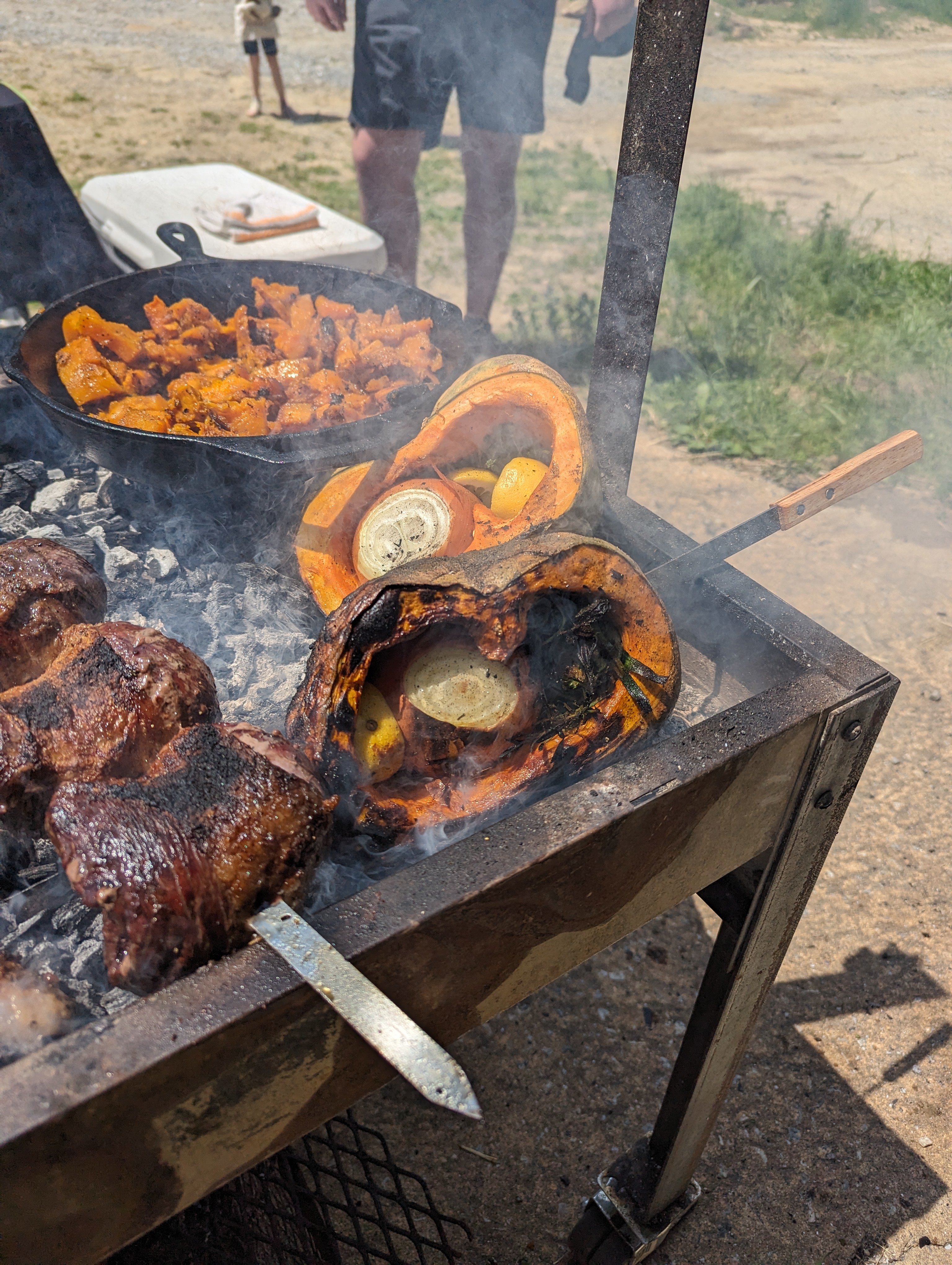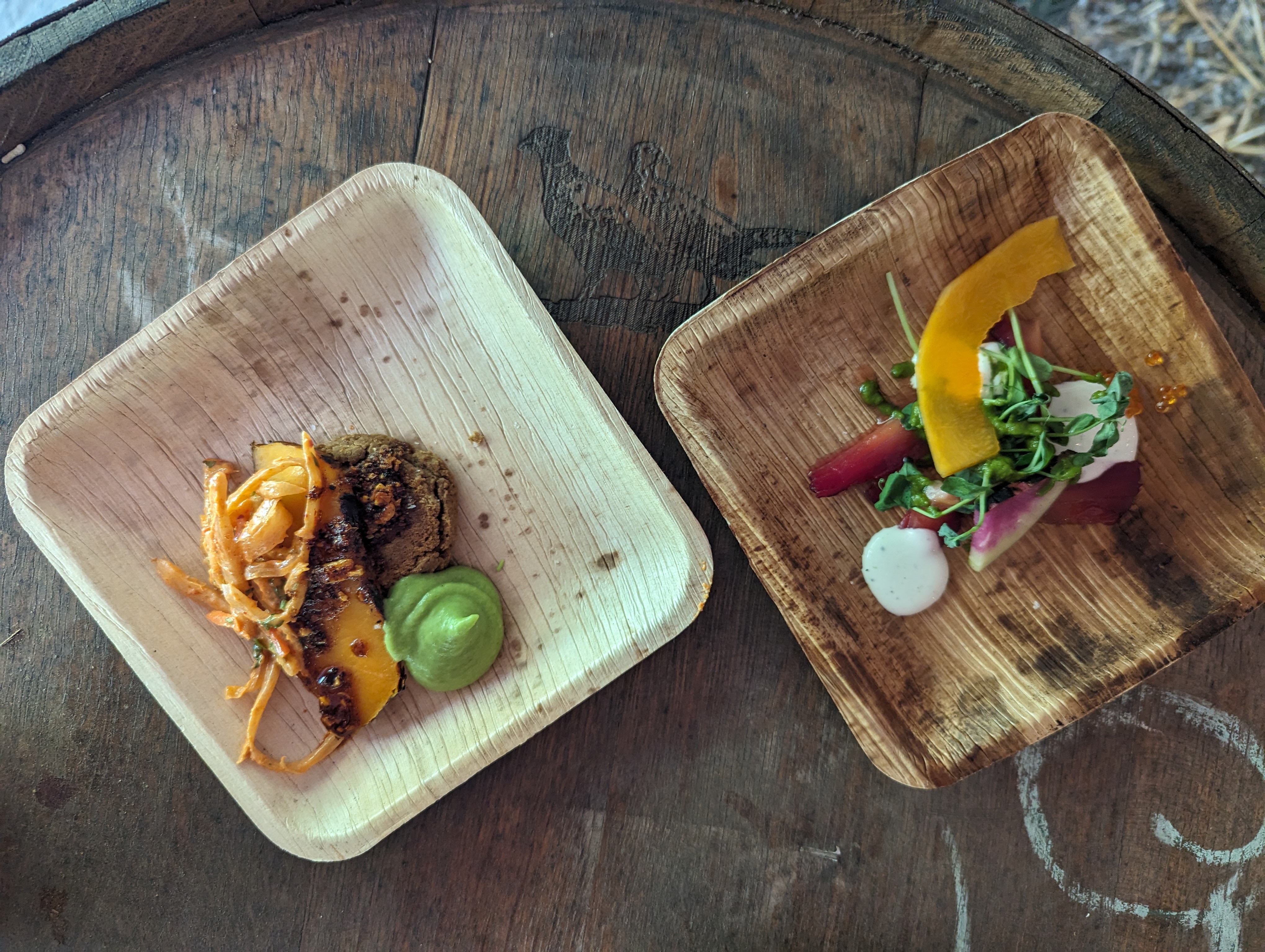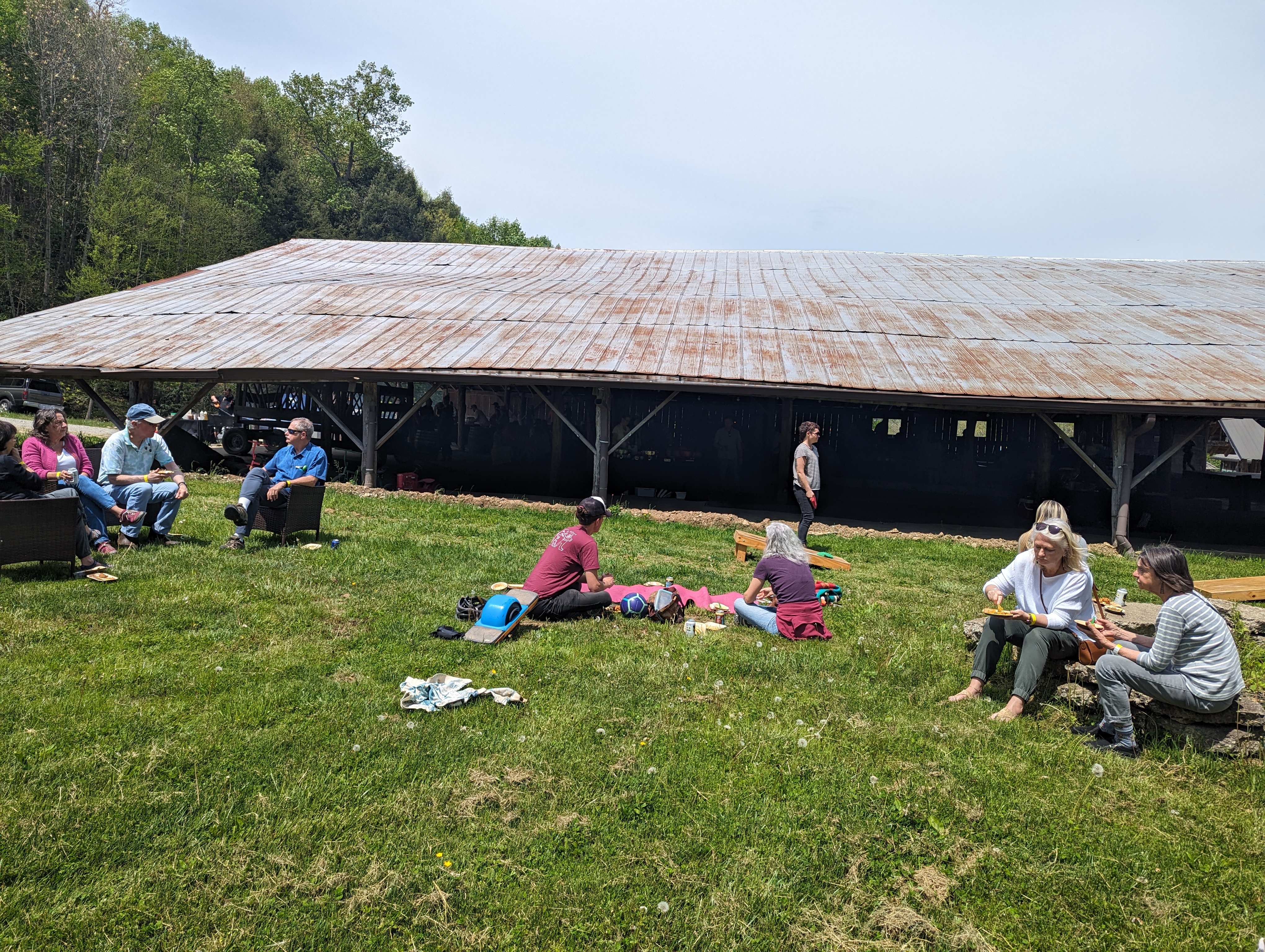On this gorgeous mountain day, people have joyfully spread blankets on the bright green lawn of Hickory Nut Gap, a regenerative livestock farm south of Asheville. Folks wander among chef stations in the open-air barn, balancing little plates of orange squash curry on top of sweating cans of beer and glasses of cider, murmuring approvingly to one another about each bite.
The April tasting was one entry in “Trial to Table,” an annual series of five food events hosted by Utopian Seed Project, a Western North Carolina-based nonprofit founded in 2018 to strengthen the food system by encouraging the local cultivation of different crops. This edition, devoted to squash and the bounty of types that can be grown in Southern Appalachia, was a sellout.
Halfway through the tasting, Utopian Seed Project founder Chris Smith got on stage and made an impassioned speech about squash that left everyone feeling like the crop could save the world—like we could save the world, if we each just took home a packet of seeds and found somewhere to plant them.
“We could be growing enough seeds to supply all of the Southeast,” Smith said. People cheered, even folks in the back who Smith assumed weren’t listening. “Even though this is meant to be fun, and I want you to enjoy the food, it’s serious work.”
It’s the serious work that seems to have brought most people out to Trial to Table.

“It’s not just about eating delicious food,” said attendee Hildy Teegen, the former dean of University of South Carolina’s business school. “It’s appreciating what it takes to make this happen and why it’s so important to all of us.”
Across the Southeast, diners are demanding more meaning and connection from food festivals, which were once unapologetic frenzies of debauchery. In 2004, Asheville’s Grove Park Inn hosted a Wine & Food Festival that centered on a global Sauvignon blanc tasting, Tennessee whiskey tasting and California wine dinner.
Now festivals focus on storytelling and experiences, like the BayHaven Food and Wine Fest in Charlotte, a celebration of Black foodways and culinary talent.
Chef Awo Amenumey, owner of Charlotte-based Eh’vivi Ghanaian Cuisine, described BayHaven as “very fulfilling.” She said, “I started Eh’vivi to bring Ghanaian food to the forefront of the culinary scene, so it’s an opportunity.”
Industry experts say an emphasis on context and culture is indicative of where food festivals are heading
“There is this reckoning,” said Ted Lee, who co-produces the Florence Wine & Food Festival in South Carolina’s Pee Dee region, along with his brother Matt Lee. “Certainly, it’s to have fun with your friends, but what takeaway do you get? What do you learn?”
But there’s another big challenge unifying festival organizers: money. Sponsors may be willing to donate in-kind materials like booze and venue space, but access to the no-strings-attached cash they need to make these meaningful experiences a reality is harder to come by.
Never Too Big to Fail
In February, Chow Chow Food & Culture Festival in Asheville, North Carolina announced its immediate shutdown, with its board citing “underperforming sales “and “mounting…financial obstacles” as the reason in an emailed statement. Multiple Chow Chow board members didn’t return messages seeking additional comment.
The community of food lovers and emerging culinary talent in Asheville were shook by the stoppage, in part because the festival seemed too big to fail. Founded by some of the biggest area names in food—including Katie Button of her eponymous restaurants and Meherwan Irani of Chai Pani Restaurant Group—Chow Chow had been operating to great fanfare since 2019.

The gap Chow Chow’s shutdown created inspired Jefferson Ellison, principal of the communications agency JD Ellison & Company, to plan a new festival in Asheville called “Bite Me,” slated for August. He felt called to the task, but also daunted by it.
“When you see Chow Chow failing,” he said, it makes people with fewer connections and less capital think, “if they can’t do it, how could we do it?”
“But if we’re going to fail, we’re going to fail daring greatly,” he continued. “I am not convinced that there’s no way to do this.”
By “this” Ellison doesn’t mean a hot afternoon spent standing in line at booths for 1-ounce pours and small plates. He means a communal reclamation of food and storytelling that is truly accessible, equitable, and properly scaled—something he feels most food festivals have failed to do up to this point.
As Ellison sees it, rather than adjust their programming to stay on budget, organizers decide on a figure they need to realize the festival of their dreams, then get locked into publicity demands from sponsors that distract from their meaning and mission. Ellison calls it “logo soup,” referring to the collection of tiny brand icons you often see on marketing materials for festivals, and he says it’s a critical distraction from what festivals should focus on: the culinary talent and the food itself.
Wanted: Corporate Cash
Food festivals have three main options when it comes to financing. One of the most common strategies is exploiting chefs for free or cheap labor and food. Another all-too-common option is to pass on the costs to the consumer in the form of three-digit ticket prices that are preventatively expensive for most people, creating an elite experience that’s lacking in diversity and ultimately less engaging and interesting.
The most equitable option from a financial perspective is also the most difficult one: secure interested corporate sponsors to subsidize the event, allowing the festival to properly compensate talent and provide true access to a broad cross-section of the community.


“You’ve got to have huge sponsorships for this—deep, deep pockets,” said Terri Terrell, director of development for the Utopian Seed Project.
Trial to Table has been happening for several years but has never turned a profit. Up until now, organizers were satisfied to raise awareness of their mission. But this year, the Utopian Seed Project is seeking event sponsors for the first time with the hopes of paying chefs more, offering free and lower-priced tickets, and maybe generating some proceeds for the nonprofit.
“If we’re going to raise money off of these events,” said Smith, “it’ll be through corporate sponsorship, not by screwing over the chefs and not by overcharging the consumers.”
East Fork Pottery has been a sponsor for several food festivals of varying sizes, from Charleston Food & Wine to the Killer Tomato Festival in Georgia. Ha Nguyen, vice president of the company, said East Fork has seen a slight increase in sponsorship requests for smaller, “grassroots initiatives” lately, which offer a different kind of return on investment for sponsorship.
“A smaller or a new food festival is where we have greater impact,” she said. “It allows our customers to see things that our company values.”
Late Start
A brand new festival, Wilmington Feast, has large sponsors US Foods and Cheney Brothers behind it. But ticket prices are still high–the most affordable event is $100 to attend and a weekend pass is $500. Chefs are provided a $500 credit from the sponsors to offset their food costs. With that, they’re expected to provide 500 to 800 small servings.
While food distributors such as US Foods, Cheney Brothers, and Sysco are motivated to get their products in front of chefs, Terrell of the Utopian Seed Project isn’t after ingredients or service ware. “What you really need is cash,” she said. “That is what is so needed, without strings attached.”
Yet figuring out what sponsors want in exchange is a complicated, delicate game. The would-be beneficiary may come armed with a document outlining what kind of recognition and perks sponsors receive for a given amount of support, and ensuing negotiations are still slow and involved.

Terrell has yet to secure a single sponsor at the $10,000 level. She approached more than 15 potential sponsors and only three agreed to contribute cash to the event, all less than $3500.
“We’re going to come way under,” she said. “We’re not going to be at all anywhere close this year to what we dreamed of.”
Terrell has all but given up on recruiting presenting sponsors. In-kind sponsorships have been relatively easy to get, but budgetary timelines have been a major obstacle for getting cash sponsorships, even though the group hasn’t put any philosophical restrictions on its sponsor search.
“As far as cash,” Terrell said, “that’s been hard… Most of the feedback was just that we got in touch too late.”
Ellison is coming up against the same problem while seeking sponsorships for Bite Me.
“It shows you how not nimble businesses are when it comes to this sort of work,” Ellison said. “The idea that every community-focused event has to be known and planned and have a value on it before the year even starts—that’s not how community work works.”
Ellison has secured some sponsors, including East Fork, which has contributed cash and an in-kind donation of media allocation. The city’s tourism department, Explore Asheville, has agreed to direct a portion of its influencer budget to Bite Me, meaning they’ll foot the bill for select influencers’ participation. (Explore Asheville also provided a small level of sponsorship for Trial to Table.)
Learning Process
In July, Terrell is going to start approaching potential sponsors about the 2025 Trial to Table series.
“My hope is to look at this picture from every single angle and [see] what is fair,” she said. “These festivals are going to crumble and burn unless they can reimagine themselves and change the narrative. We’ve got to be able to use a different lens.”

Still, Matt Lee points out these are early days when it comes to the food festival format.
“North America is still in the infancy of developing a food festival culture,” he said. “It hasn’t really existed for more than a couple decades in its current form, so we’re still learning. We’ve seen the pendulum swing back and forth on ways of doing it.”
To put it another way, North Carolinians who desire long-lasting food festivals with affordable ticket prices and properly compensated contributors still have to puzzle out what they can cultivate here, and which format is likely to flourish. As any seed saver can tell you, it’s a trial-and-error process.
Emma Castleberry is a freelance writer and reporter living in Asheville. Her favorite day is one spent outdoors followed by lots and lots of food.


